Top 50 AFL players of 2018
‘The Roar’ 20th October 2018
In a season where Patrick Dangerfield and Dustin Martin fell away, while Nat Fyfe got injured, there was no obvious standout for number one.
Is it the coaches’ choice, Max Gawn? The umpire’s choice, Tom Mitchell? Or is it Brodie Grundy, the winner of several media awards?
Most unlucky to miss out on the top 50 was Brisbane’s magnificently balanced defender Harris Andrews, who played a few poor games early on, and then missed too many through injury, but watch out for him in 2019.
The hard-nosed Luke Parker and strong leader Trent Cotchin were also close, but didn’t have quite enough effective disposals to compete with the midfielders in this top 50.
This is my top 50 for 2018, with comparisons made to a 2017 top 50 article I did for Footy Almanac
50. Isaac Heeney, Sydney
Last year – NA
Patchy footy at times in 2018, but lit up several matches with magic moments, including game saving interceptions (and the mark of the year) against Melbourne. Versatility was valuable, as he simply takes every opportunity at either end in one, clean grab.
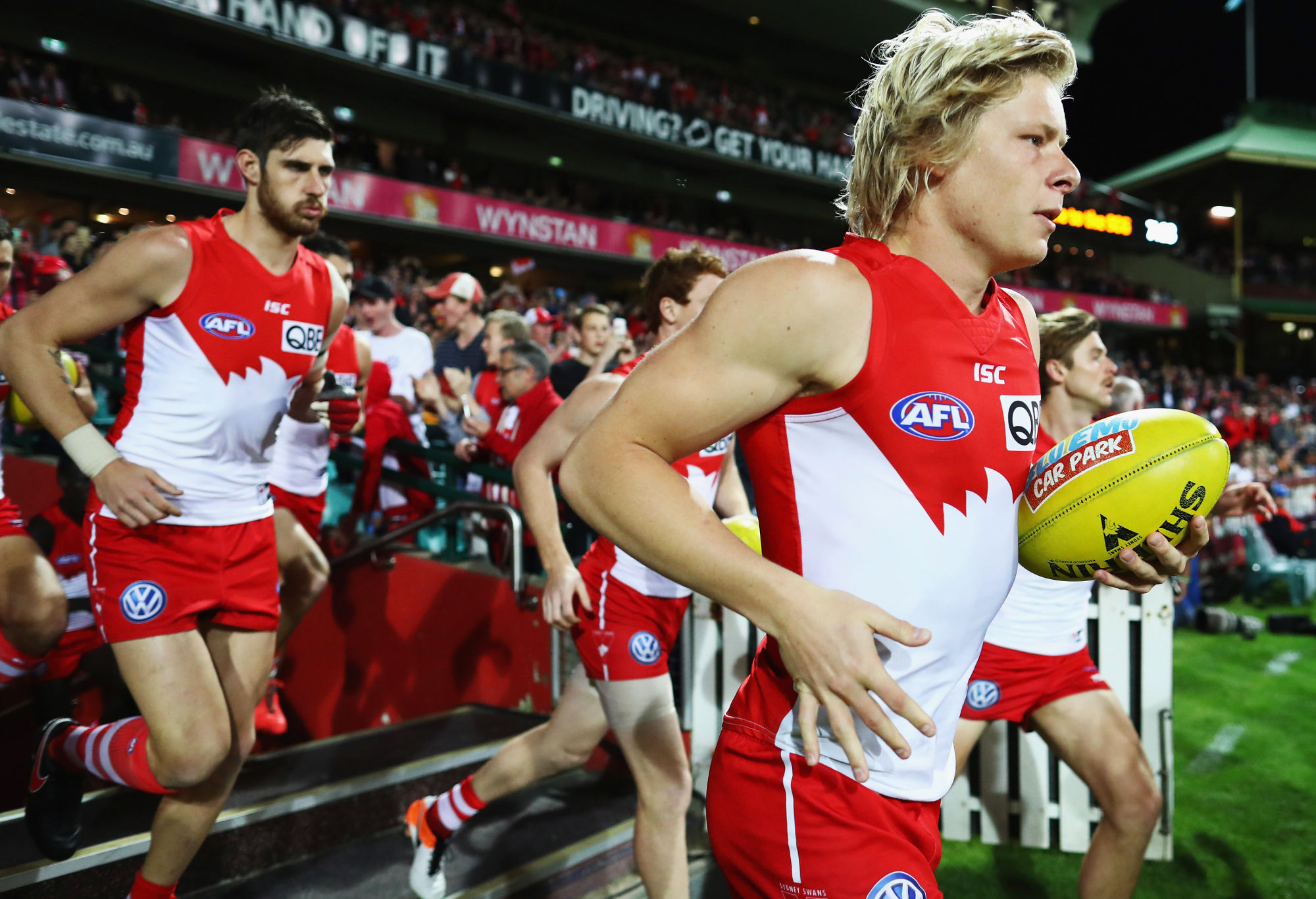
Isaac Heeney. (Photo by Ryan Pierse/Getty Images)
49. Dyson Heppell, Essendon
Last year – 50
The classy maestro led his side with strong attack on the footy and a willingness to take the game on which, unfortunately, led to some costly turnovers.
48. Jake Lloyd, Sydney
Last year – NA
A super consistent year from the reliable defender. May not have the run and dash of some of the game’s best half-backs, but certainly demonstrated some fine kicking skills to break the game open from the defensive 50.
47. Joel Selwood, Geelong
Last year – 22
Perhaps coming towards the end of his reign as the one the league’s elite midfielders, but was still elite in his courage and drive in a contest. Showed strong leadership in the elimination final loss despite the tag.
46. Devon Smith, Essendon
Last year – NA
Tackle numbers alone force Smith into the top 50, ranked fifth in history for a season. Often lifted the Bombers with his work rate and energy in the midfield, rewarded with a best and fairest victory. Kicking can be wayward, but wins a lot of footy under pressure.
45. Neville Jetta, Melbourne
Last year – 41
Another solid year from one of footy’s best blokes. Absolutely immense against Dangerfield in the elimination final, containing him in at least three or four one-on-ones, before keeping Luke Breust goalless the next week.

44. Luke Shuey, West Coast
Last year – 45
How about that performance? Carried his side through the first half of a grand final, kicked a beauty, and finished with five score assists in one of the great grand final performances. Was just an OK year before that, but it’s the big stage that really matters.
43. Tom McDonald, Melbourne
Last year – NA
One of the moves of the year, becoming a full-time forward who kicked 53 goals. Most importantly, McDonald was a reliable leading target, while also providing a contest, allowing small forwards Jake Melksham, Charlie Spargo and Christian Petracca to flourish.
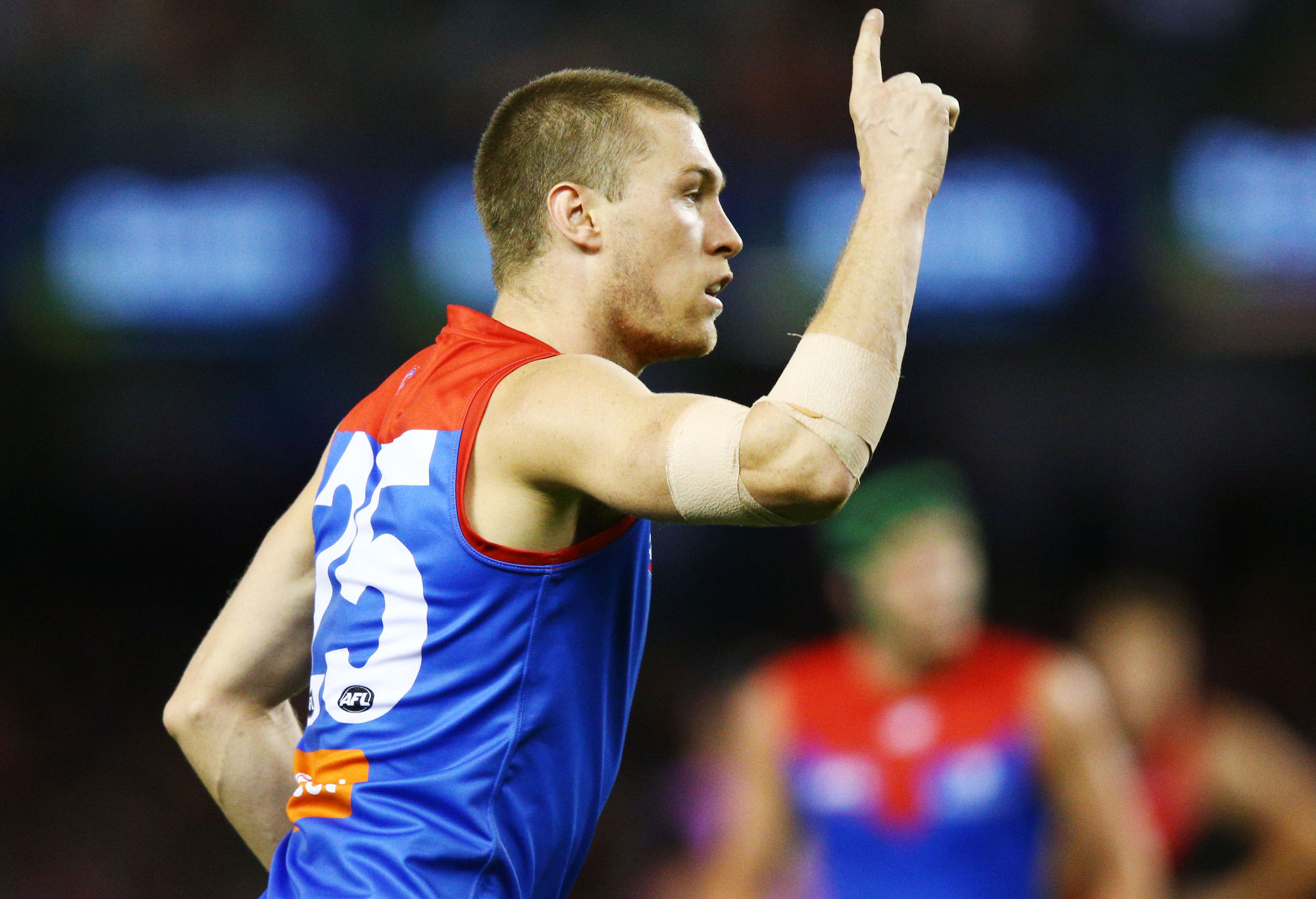
Tom McDonald of the Demons celebrates a goal. (Photo by Michael Dodge/AFL Media/Getty Images)
Set-shot accuracy was also a highlight, his straight kicking vital early against Hawthorn in the semi-final, nailing Melbourne’s first two before finishing with 4.0.
42. Tom Jonas, Port Adelaide
Last year – NA
A bolter in this year’s All-Australian squad, Jonas was reportedly very close to selection in the team. Combined the defensive accountability he has always had with a new-found ability to intercept and rebound from the defensive 50. Came second in the Port best and fairest despite playing just 18 games.
41. Jack Darling, West Coast
Last year – NA
Wow. Quite the year of ups and down for Jack. From six goals and six contested marks against Richmond, to an ankle injury, to a grand final third quarter inspiration, to that dropped mark, it’s a difficult season to judge. However, a return of 48 goals and some match-winning performances were clearly vital to the Eagles’ success.
40. Ben Cunnington, North Melbourne
Last year – NA
Breaking the record for contested possessions in a game is quite the feat. More than just a ball-winner though, Cunnington is one the best handballers in the game, with outstanding balance and decision-making.
39. James Sicily, Hawthorn
Last year – NA
Would’ve been a lock for All-Australian if he’d played all 22 games. An amazing all-round talent, the Sicilian is an incredible overhead mark for his size, but is also one of the game’s best kickers off half-back. Will be a star if he can direct his anger more efficiently.
38. Taylor Adams, Collingwood
Last year – NA
The much-maligned terrier improved his kicking tremendously to become an all-round quality mid. A few clangers from time to time, including a grand final shocker (don’t worry Alex Woodward, Yeo would’ve marked it anyway), were overridden by his relentless drive and enthusiasm at stoppages, most evident in finals footy.
37. Tom Stewart, Geelong
Last year – NA
Perhaps had an easy role as loose man back in a defensive side, but certainly made it his own, reading the play to a tee. Rewarded with All-Australian honours, Stewart often appeared impassable.
36. Lachie Neale, Fremantle
Last year – 38
Hard to fault Neale’s last three years, with similarly excellent output throughout, consistently amongst the AFL’s best stoppage players. Only a contested mark or a goal away from being an elite midfielder.
35. Scott Pendlebury, Collingwood
Last year – NA
The man who makes time stand still struggled to have his usual impact in 2018, but nevertheless demonstrated countless moments of magic. His kicking continues to amaze, simply never mistiming a pass.
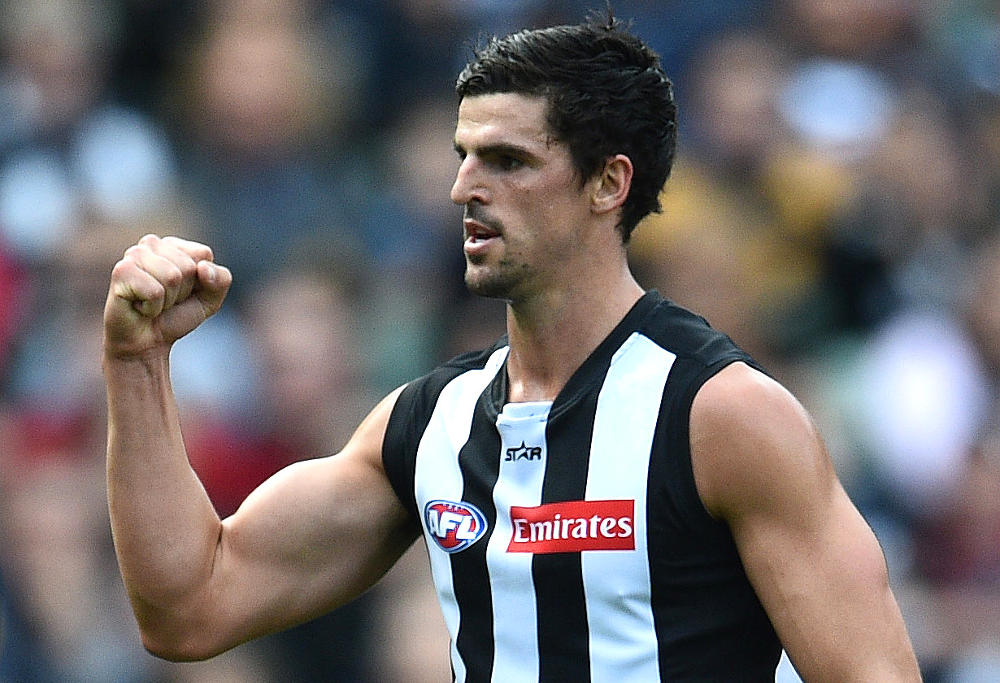
Scott Pendlebury of the Magpies. (AAP Image/Julian Smith)
34. Phil Davis, GWS Giants
Last year – NA
Keeping a very injured Buddy goalless in the elimination final may have been slightly overstated by the media, but his performance against Buddy earlier in round 22 was certainly understated. Keeping him quiet in the first half, only his injury allowed Buddy to go on a rampage in kicking five quickfire goals, with Davis’ importance to the GWS backline becoming evident.
33. Jayden Short, Richmond
Last year – NA
A revelation, much of Richmond’s home and away improvement came from this running sensation. Leading the competition in metres gained, Short’s drilled his way through the opposition with his long kicking, which was perfect for Richmond’s counter-attacking game style. Also solid defensively, Short had an exceptional year.
32. Robbie Gray, Port Adelaide
Last year – 34
A stunning first half year of the year, sparked by a midfield move early on, before a quiet second half as Port’s season deteriorated. Port’s forward-half struggles compelled their best player to change roles, perhaps to his detriment except for one of the great Showdown performances.
31. Dayne Beams, Brisbane
Last year – NA
Bold move to give up the captaincy paid dividends, as he turned around his season to become a dominant midfielder after round five. His 18-goal tally was a feature, and he helped the Lions over the line with strong performances in two crucial wins over Hawthorn.
30. Jordan de Goey, Collingwood
Last year – NA
The big game superstar metamorphosed his reputation from troublemaker to genuine matchwinner in the space of eight months, and threatens to tear the competition apart in 2019. Dynamic at stoppages, devastating from outside 50, and destructive on the lead.
29. Dylan Grimes, Richmond
Last year – NA
A rock at the back, and probably the best one-on-one defender in the competition. Deceptively quick off the mark, his ability to support teammates as third man up improved tremendously in 2018. Only knock is lack of attacking run.
28. Stephen Coniglio, GWS Giants
Last year – NA
An outstanding all-round midfielder, Coniglio has always been solid defensively, and further improved his ball-winning and offensive game this season. His final against Collingwood was perfect until a fourth quarter drop off which, unfortunately, was a regular occurrence throughout the year, causing him to fall outside my top 25.
27.Shane Edwards, Richmond
Last year – NA
The Pendlebury-esque creator put his magnificent poise, agility and awareness to full use in 2018, averaging his most ever disposals. His little taps and tricks in the Dreamtime game were simply a joy to behold.
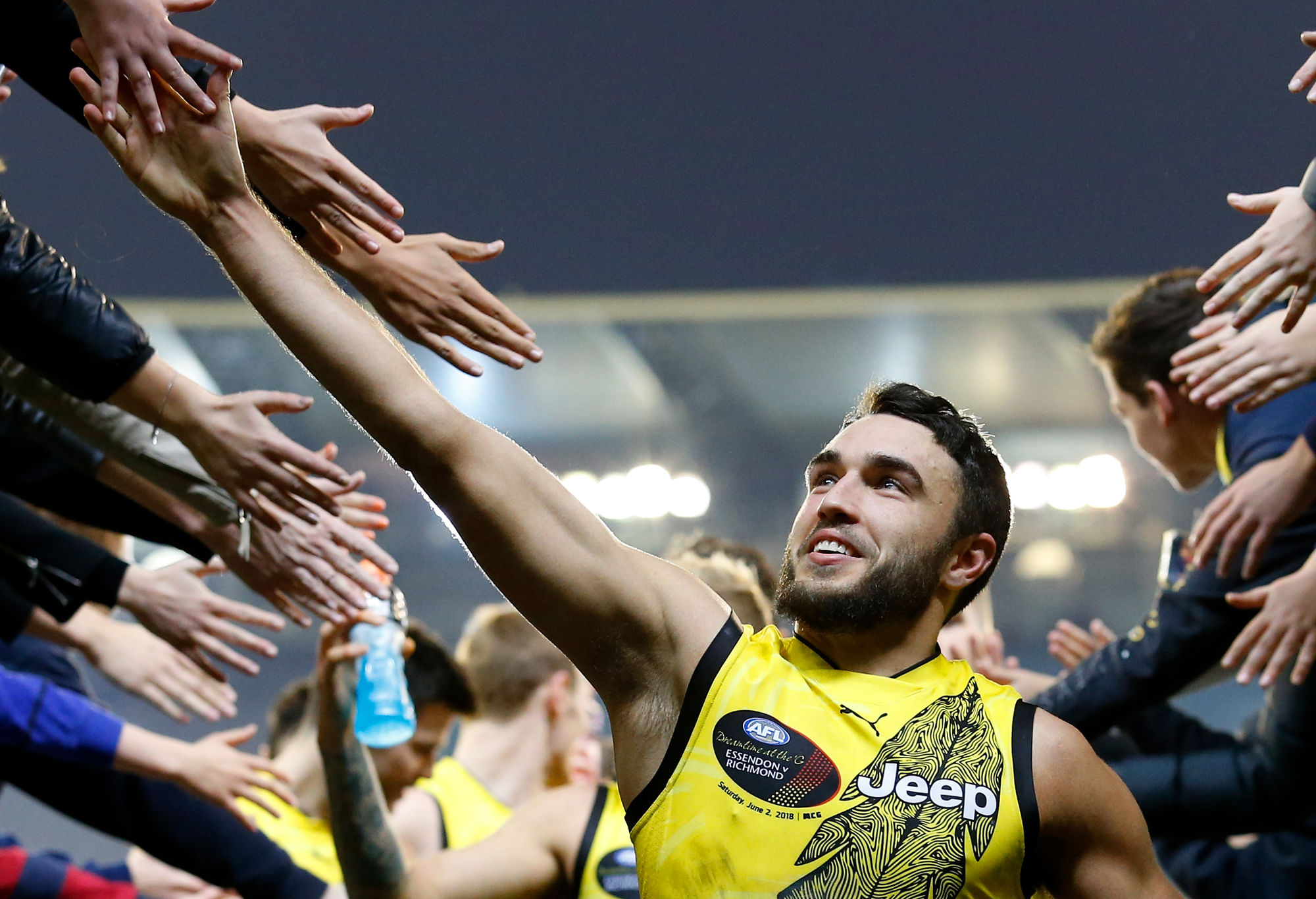
Shane Edwards of the Tigers. (Photo by Adam Trafford/AFL Media/Getty Images)
26. Jackson Macrae, Western Bulldogs
Last year – NA
Perhaps didn’t have the same impact as some of the game’s superstars, and only played 19 games, but the pure quantity of disposals (ranked second per game) is enough to place him amongst the year’s best mids. Although bursts of pace or goals were rarities, he was very efficient with his disposal.
25. Luke Breust, Hawthorn
Last year – NA
A poor finals series does not override a stunning season, ranking top 10 for both goals and goal assists. His ability to swivel out of danger or fend off an opponent is unmatched amongst small forwards, and we all know Breust does not miss.
24. Josh Kelly, GWS Giants
Last year – 3
A controversial selection, only playing 15 games, but he would’ve been close to number one if he’d played all season. Dazzling with his run and dash out of the midfield, no other player has his combination of strength at the contest and scintillating efficiency forward of centre.
23. Ben Brown, North Melbourne
Last year – 46
Big Benny’s goalkicking output was similar to 2017, but he doubled his effectiveness in creating goalscoring chances for crumbers at ground level. The long long long run-up continues to impress, with Brown having the third best accuracy of the top 20 goalkickers.
22. Jack Gunston, Hawthorn
Last year – NA
As adaptable as a chameleon, Gunston switched ends with ease almost on a game-by-game basis. No other player his size roamed the field with such class and precision, whether in front of goal or rebounding off half-back. So very close to a game-turning performance in the final against Melbourne, when poor goalkicking let him down.
21. Elliot Yeo, West Coast
Last year – 35
Collingwood’s decision to let Yeo run loose in the second-half of the grand-final may well have been costly, as Shuey continued to dominate and combined with Yeo to control the midfield battle. Erratic and clanger-prone at times, but his power and dynamism were vital to West Coast’s success in 2018. Launched huge goals, laid team-lifting tackles (including on the un-tackleable Dusty Martin), and floated back to take crucial intercept marks.
20. Shannon Hurn, West Coast
Last year – 48
A shaky start to the grand-final threatened to take the shine of a season of immense leadership, but recovered to rally the troops in a second-half fightback. The most penetrating kick in the AFL added intercepts to his repertoire to have a fine season as a rock-solid half-back.
19. Callan Ward, GWS Giants
Last year – 28
Of the game’s toughest, most courageous midfielders, Ward must surely be the most poised and balanced under pressure. Attacked every contest with venom, especially important in finals footy, but also rarely turned the ball over.
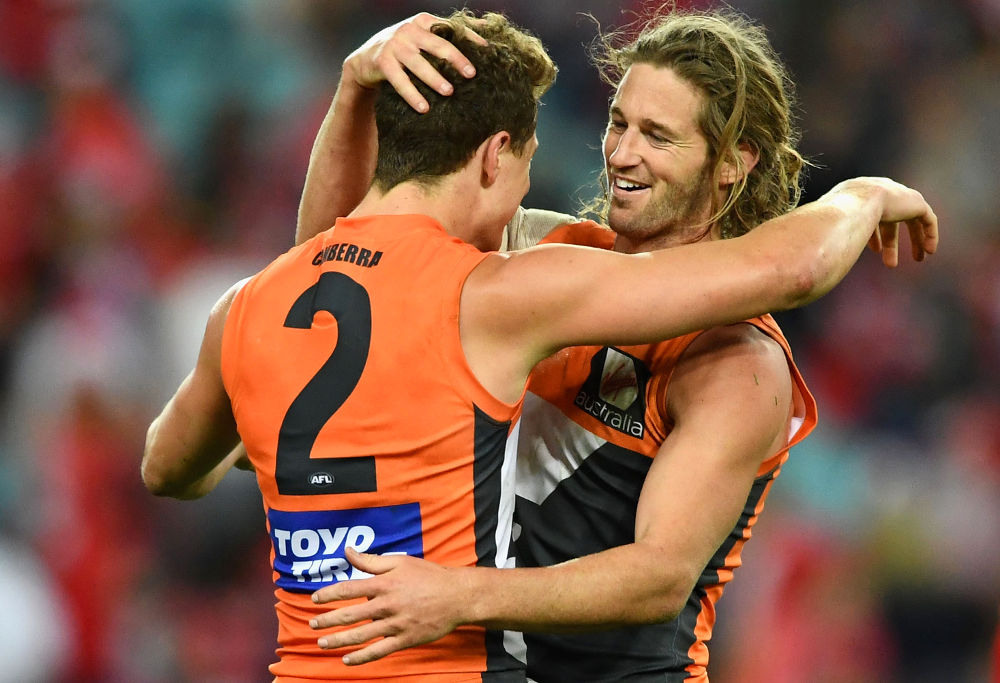
Callan Ward. (Photo by Quinn Rooney/Getty Images)
18. Alex Rance, Richmond
Last year – 4
The competition’s best defender no more, Rance had a few shockers, most notably against Mason Cox and Collingwood in the preliminary final. Nevertheless, my guess is no defender saved more goals by timing third man up intercepts to perfection.
17. Rory Laird, Adelaide
Last year – 15
The most complete offensive backman, Laird combines strength at the contest with run and dash. Only dropped from last year because of impressive 2017 finals performances he didn’t get the opportunity to replicate.
16. Nat Fyfe, Fremantle
Last year – 33
Clearly the best player in the competition over the first 13 rounds, Fyfe was at his scintillating best before succumbing to injury. There is simply no other player capable of his athletic feats, whilst gliding across the field and courageously throwing his body at the ball.
Averaged almost a goal a game, more contested marks than any other midfielder, and finished top 20 in a Coaches’ Award that strongly rewards games played.
15. Tom Hawkins, Geelong
Last year – NA
Carried his side to victory in a momentous second-half against Melbourne, in one of the decade’s great full-forward performances. An amazing turnaround after it appeared as though the game had passed him.
14. Andrew Gaff, West Coast
Last year – NA
Ignoring the fairness factor in this top 50, Gaff played a mighty 19 games. More influential than ever before, he added some grit to his game style, and kicked his most ever goals.
13. Lachie Whitfield, GWS Giants
Last year – NA
One play from the semi-final sums up Whitfield’s year. After three or four determined efforts at half-back, Whitfield’s class allowed him to come away with the ball, before bursting away and launching a tired kick deep inside 50 to a marking Jeremy Cameron. A mixture of hard work, dynamism, and the AFL’s best two-sided kick.
12. Dustin Martin, Richmond
Last year – 1
The match winning genius once again performed brilliantly in the only final he was at full fitness, even nailing an impossible goal from the boundary. Kicked an impressive 31 goals from midfield, but had minimal impact from rounds 5-16 (almost half the season), making it too many quiet games for the top 10.
11. Lance Franklin, Sydney
Last year – 8
If you received bonus points for playing with an injury, Buddy would no doubt be number one. How he still won his side three or four games without training all season is beyond me. An absolute honour to see this great man in action, from nailing 60-metre goals to inch perfect goal assists to crunching tackles.
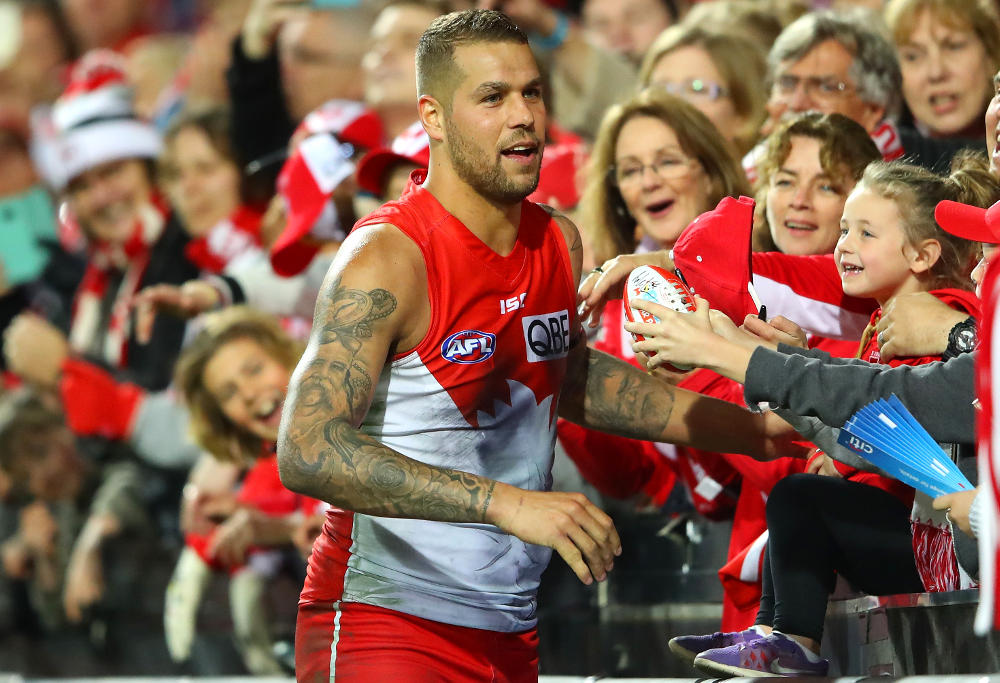
Lance Franklin of the Swans. (Photo by Cameron Spencer/Getty Images)
10. Patrick Cripps, Carlton
Last year – NA
An absolute bull and a player who will inspire his teammates for years to come. His size is an unstoppable asset, both at ground level and in marking contests. Though a tackling machine, Cripps struggles defensively when the ball leaves the stoppage, without having the speed to chase, which meant I placed him at ten, perhaps lower than most.
9. Shaun Higgins, North Melbourne
Last year – 42
If Cripps carried his side, Higgins was the tour guide for his. I would doubt any other player improved his side’s fortunes more than Higgo, as the Kangas midfield relied enormously on his ability to turn a stoppage win into an inside 50 mark.
May not always get 30 disposals, but has the inside grunt, agility, poise and goalkicking nous to well and truly make up for it.
8. Steele Sidebottom, Collingwood
Last year – 47
An impeccable finals series before the grand final, but you can’t help being tagged. Capable of so many rare skillsets, but did the simple things well so consistently this year as well. His bullet passes to Mason Cox were central to the Pies making it to the big one.
7. Patrick Dangerfield, Geelong
Last year – 2
After a quiet first half to the year, Danger got back close to his best, with his trademark elastic-like 2nd and 3rd efforts and galloping runs. Despite playing forward more, didn’t kick as many goals as 2017, but was still elite amongst midfielders.
6. Brodie Grundy, Collingwood
Last year – NA
You don’t always want your ruckman getting the ball, as they tend not to be great ball-users, and this was certainly the case with Grundy last year. But the hipster ruckman turned around his efficiency to the point where he was kicking goals on the run from 45 metres out.
Had a magnificent impact with his size and athleticism, dominating against weaker opponents such as Shaun Grigg in the preliminary final.
5. Clayton Oliver, Melbourne
Last year – 21
There’s not much this young man can’t do. Wins a heap at the coal face, bursts away with pace, generally kicks the ball well, tackles ferociously, has brilliant spatial awareness, and can take a contested mark up forward. Three fine finals performances topped off an excellent year, in which he just didn’t play a bad game.
4. Jeremy McGovern, West Coast, key back
Last year – 16
Two minutes left. One one one with De Goey. Stay or go? Go. Go again, and nail a 40-metre bullet to Nathan Vardy. This grand final play epitomises the courage, timing, poise and skill of the AFL’s best one-on-one defender, and the AFL’s best interceptor. Only a disappointing stint up forward stops McGovern making the top three.
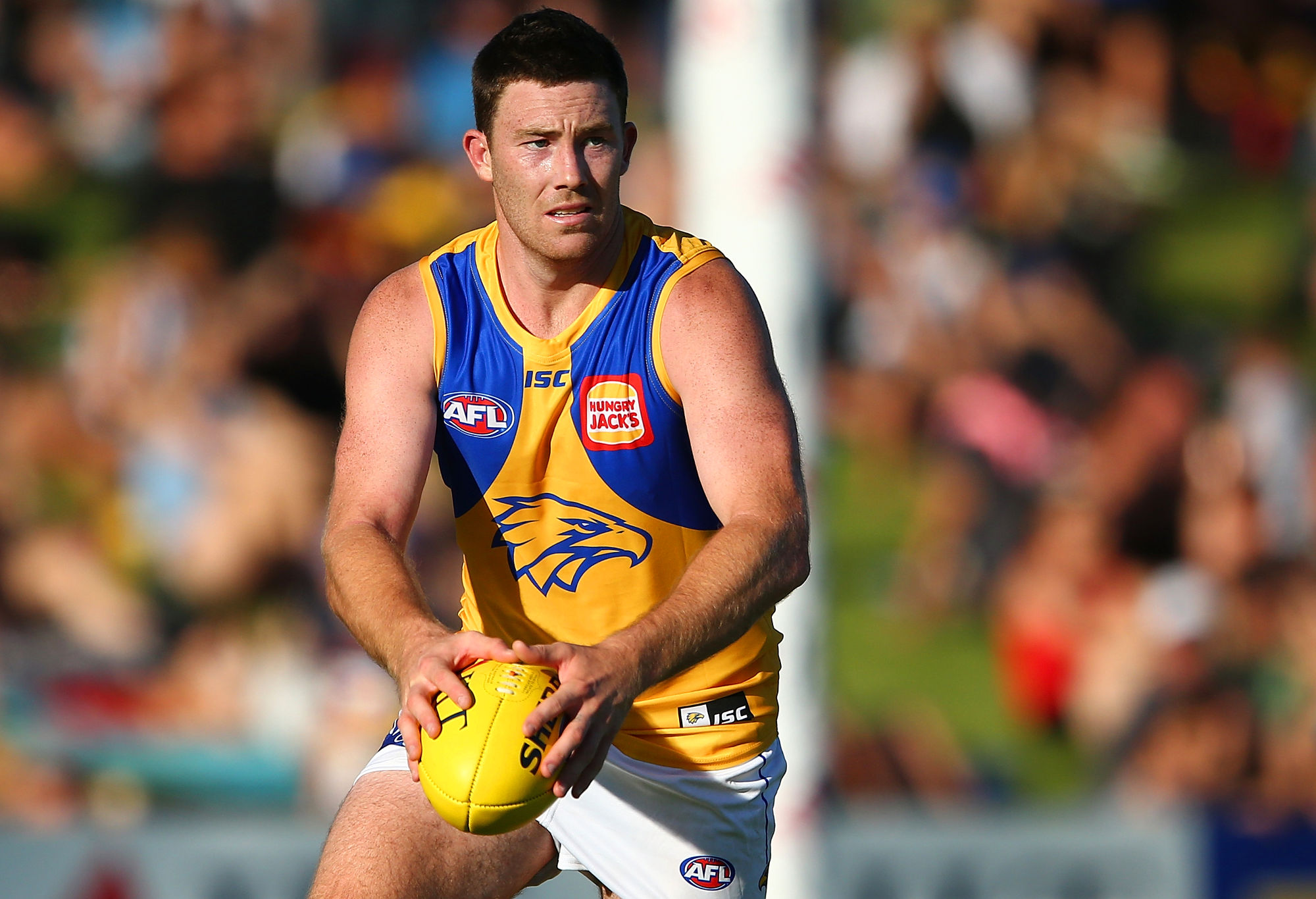
Jeremy McGovern. (Photo by Paul Kane/Getty Images)
3. Jack Riewoldt, Richmond
Last year – 25
His transition from a young full-forward with body language issues to a magnificent team-oriented forward has been superb. When he’s not kicking goals, the Tigers champ is bringing the ball to ground for his small forwards to feast on. Kicked five against the flow in the preliminary final loss.
2. Max Gawn, Melbourne
Last year – NA
Is big Maxy the best ruckman since Dean Cox? Probably, as he’s broken all records for hitouts to advantage, which is the most important statistic for a ruckman. What separates him from other great tap ruckman is his ability to clunk a big contested mark, so crucial both in defence and up forward.
Would be number one if he’d kicked the winning goal in the dying seconds against Geelong.
1. Tom Mitchell, Hawthorn
Last year – 6
Became the game’s most influential midfielder in 2018, not only ranking second in contested possessions, but also using the ball more efficiently than most other inside mids. Although not quick over a long distance, his initial acceleration and agility, along with a calmness under pressure, allowed him to pick out a teammate more often than not.

